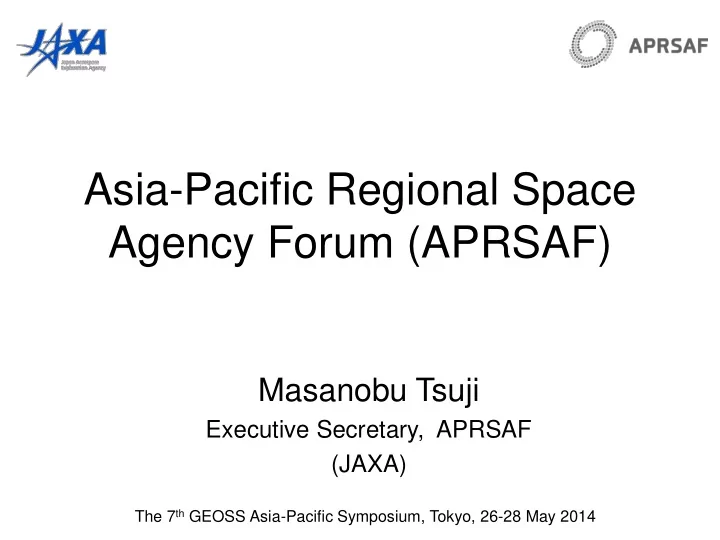

Asia-Pacific Regional Space Agency Forum (APRSAF) Masanobu Tsuji Executive Secretary, APRSAF (JAXA) The 7 th GEOSS Asia-Pacific Symposium, Tokyo, 26-28 May 2014
Principles APRSAF (Asia-Pacific Regional Space Agency Forum) Regional Cooperation Framework for Space Activities Largest space community in the Asia-Pacific region Contributing socio-economic benefits in the region 20 th Anniversary in 2013 Objectives Promotion and expansion of space activities and applications for socio-economic development in the region. Participants Space agencies, governmental bodies, international organizations, universities, research institutions, private entities Organizers Japan (MEXT, JAXA) and local host organizations 2
20 th Anniversary 2013 20th APRSAF (2013) 423 Participants 1st APRSAF (1993) Approx. 60 Participants 28 Countries & 15 Countries & Organizations Organizations 1993 1992 ISY 3
20 th Anniversary in Vietnam 20th session of Asia-Pacific Regional Space Agency Forum (APRSAF), was successfully held on 3 - 6 December, 2013 at Melia Hanoi, Hanoi, Vietnam. The forum was co-organized by VAST, MEXT, and JAXA 423 participants from 28 countries and 8 international organizations [Theme] Values from Space: 20 Years of Asia-Pacific Experiences EO WG CSA WG Plenary Session SEA WG SEU WG Asian HOA Panel Discussion Poster Contest Water Rocket Exhibition ISS Event
History Established in 1993, following Japan APRSAF-1 1993 the Asia-Pacific International Japan APRSAF-2 1994 Space Year Conference (APIC) Japan APRSAF-3 1996 in 1992. Japan APRSAF-4 1997 Mongolia APRSAF-5 1998 2001 Japan APRSAF-6 1999 4 Working Groups Japan APRSAF-7 2000 Malaysia APRSAF-8 2001 Korea APRSAF-9 2003 2005 Thailand APRSAF-10 2004 Sentinel Asia Australia APRSAF-11 2004 Japan APRSAF-12 2005 2008 Indonesia APRSAF-13 2006 SAFE India APRSAF-14 2007 Vietnam APRSAF-15 2008 Thailand APRSAF-16 2010 2011 Australia APRSAF-17 2010 Climate R3 Singapore APRSAF-18 2011 Malaysia APRSAF-19 2012 2012 APRSAF-21 2014 Kibo-ABC Vietnam APRSAF-20 2013 (c) 2014 Google - Image (c) 2014 NASA TerraMetrics
Participation Increasing the number of participants and participating countries/organizations Increasing participation of high-level officials 450 50 45 400 40 350 35 300 30 250 25 200 20 150 15 100 10 50 5 0 0 # of Participants # of Counties+International Organizations 6
Structure Side Events
Activities Working Groups Initiatives (Cooperative Projects) Environment Monitoring Disaster Monitoring - SAFE (Space Application Space Environment Space Education - Sentinel Asia - for Environment) - Utilization (SEU) and Awareness (SEA) Regional Readiness Review Asian Beneficial Collaboration For Key Climate Missions through "Kibo" Utilization Communication Earth Observation - Climate R³ - Satellite Application - Kibo-ABC - (EO ) (CSA) Related Projects Side Events held at APRSAF-20 • CanSat competition • REDD+ with EO sat seminar • Academic conf. on AeroSpace Electronics (ICSANE) • Capacity building for Space Policy & Law WS Multi-GNSS UNiversity International (Global Navigation FOrmation Mission Satellite System) Asia - UNIFORM - 8 Exhibition of Organizations & Private sectors - MGA -
Successful Outcomes Increase the focus on using space technologies to solve socio-economic problems in the region. Establishment of 4 working groups (EO, SEU, SEA, CSA) Launch of several cooperative projects Disaster Management (Sentinel Asia) Environment Monitoring (SAFE) Climate Change (Climate R3) Utilization of the International Space Station (Kibo-ABC) Capacity Building Opportunity for Small Satellite Technology (STAR/UNIFORM) Education (Space education seminars, Water Rocket Contest, etc.) 9
Successful Outcomes - Sentinel Asia - After the Great East Japan Earthquake in 2011, satellite data were provided through Sentinel Asia framework, which allows us to observe and monitor devastated areas quickly. ALOS THEOS Chinese FORMOSAT-2 Taipei CARTOSAT-2 14 Mar ch 13 March 10 Great East Japan Earthquake Devastated Areas Observed by Sentinel Asia Constellation
Concept of Sentinel Asia Step 3 Earth observation Positioning Communication satellites satellites satellites Information delivering Information/data transmission to personal terminals Monitoring Post-disaste r Pre-disaster Just after disaster Response: Recovery: Mitigation: Emergency observation Monitoring Community education Preparedness: Hazard map Early warning system Disaster information Information sharing (Web-GIS) Human network Capacity Building, Outreach
Successful Outcomes - SAFE - SAFE Term of Reference WATER ECOSYSTEMS CLIMATE AGRICULTURE WEATHER ENERGY HEALTH BIODIVERSITY
20 years of Experience and Beyond In the past 20 years, APRSAF has created a number of sound results. The new phase of APRSAF will focus on socio-economic outcomes...... APRSAF-1 to APRSAF-11 Share Information Knowing each other APRSAF-12 to APRSAF-20 Launch Initiatives Driving Cooperation APRSAF-21 and Future Socio-Economic Outcome Extract more Value from Space For better lives of people in the region
Activities on GEOSS-AP and APRSAF GEOSS-AP APRSAF AWCI AP-BON - Water - Biodiversity EO WG CSA WG - Sentinel Asia - Space Tech - SAFE Ocean Observation GFOI and Society - Forest/CO2 - Ocean Some of projects could SEU WG SEA WG cooperate with - ISS - Education each other GEO GLAM - Agriculture
Toward More Practical Contribution for the Asia-Pacific Region The Japan International Cooperation Agency (JICA) and the Japan Aerospace Exploration Agency (JAXA) signed a partnership agreement on 23 April, 2014. The objective of the agreement is to: Contribute to solving various development challenges that developing countries are facing Work on global issues using aerospace technology Human Facilitating Resource Wide Use of Development Space-Related Systems Solving Information Development Exchange Challenges
APRSAF-21, 2014 Tokyo Co-Organizers Dates and Venue 2-5 December, 2014 Tokyo National Museum of Emerging Science and Innovation “Miraikan” Web site http://www.aprsaf.org/
Recommend
More recommend